Apparently, Mahmoud Ahmadinejad, in an interview on American television network ABC last Saturday, seems to have "forgotten" that Sakineh Mohammadi Ashtiani had been sentenced to be stoned to death.
And, in a conversation with Charlie Rose, on PBS, the sainted man even went as far as to suggest, hand on his heart, that he was opposed to the death penalty in general and to stoning in particular.
Well, no matter that the Iranian president is given--case in point--to boldfaced lies.
It's not important that he denies the terms of the verdict pronounced on September 10th, 2006, by the judges of the 6th section of the provincial court of Tabriz as well as the ruling of the Supreme Court which, in response to the appeal by Sakineh's original counsel, Sohrab Samangar, confirmed the sentence.
Or, more exactly, this is of import only in the eyes of history, and of those who will one day take it upon themselves to relate the story (which is why, moreover, we wish to publish here, and for your information, the facsimiles, translations, and commentaries concerning the nine official documents that have marked this affair and that, unfortunately, leave no doubt as to the barbarism of the punishment that may sanction an act of adultery in present-day Iran).
The essential, for the time being, is that the powers that be have by these very denials begun to retreat.
The essential, the great news, is that Ahmadinejad found it appropriate, immediately upon his arrival in New York and on the eve of the "great speech" he is supposed to give on the floor of the United Nations, to open the exit door a crack.
And a thousand times more eloquent than the lie is the extraordinary avowal of weakness this disavowal of the judges constitutes, a way of saying without actually saying, all the while saying that the sentence is one thing, its execution quite another.
Sakineh, nonetheless, is not out of the woods.
And nothing indicates that, once back in Tehran, the man will not announce to us that, in this case, hanging, for example, is an adequate substitute punishment, or even that Sakineh Mohammadi Ashtiani, her spirit broken by a campaign of international opinion that would have done her more harm than good, has been found dead, a suicide, in her prison cell.
But a step has been taken.
Words have been pronounced that we must take literally and that, when the time comes, we must not be afraid to recall.
And it is truly the proof that, as we have stated here from the very beginning, mobilisation pays and compels tyranny to give way.
Let us not weaken.
Let us not, at any price, diminish the pressure.
Now, the innocence of Sakineh must be recognized.
Now we must very rapidly ensure that her life, and then liberty, will be hers.
The fight continues.
It will be a head-on, twisted struggle.
Merciless, but filled with tricks and traps, laid by the Iranian authorities.
And so much the worse -- or the better -- if Mahmoud Ahmadinejad does not allow us to win without a means of saving face for himself.
Bernard-Henri Lévy
Sakineh, Ahmadinejad's lie
Last Saturday Iranian President Mahmoud Ahmadinejad declared in an interview on American television network ABC that the Iranian woman, "Sakineh Mohammadi Ashtiani had never been condemned to death by stoning". And he added, "This is misinformation that has been created and, unfortunately, the American media have been influenced by their politicians to fabricate this news."
Javid Houtan Kian, Sakineh Mohammadi Ashtiani's attorney, gave his reactions following these declarations on the telephone, from the city of Tabriz. "How can the president make such claims, when all the judicial authorities of the country as well as the spokesman for the Ministry of Foreign Affairs have repeated several times over that the sentence of stoning had been suspended, in response to protests against the condemnation of my client?"
For the time being, a reliable source in Iran, who wishes to remain anonymous due to fear of reprisals, has given us a series of five documents that are part of the prosecution's file of charges of adultery against Sakineh Mohammadi Ashtiani, stamped by the Iranian authorities, which contradict Ahmadinejad's assertions.
The first, document n° 11, dated May 15, 2006, is the decree of the condemnation of Sakineh Mohammadi Ashitiani to 99 lashes of the whip for "illicit relations" with two men, Ali et Nasser Nojoumi. The two other accused, Nasser Nojoumi and Ali Nojoumi, are condemned respectively to 40 and 20 lashes. Moreover, it is indicated that the punishment must be immediately applied and cannot be "bought", in other words, in Iranian law, execution of the sentence cannot be avoided by paying a fine of a certain sum of money. It is even stipulated that the whippings must be carried out in the Interior courtyard of the Palace of Justice, and that the condemned subjects must be dressed in "normal clothing" in a "temperate climate".
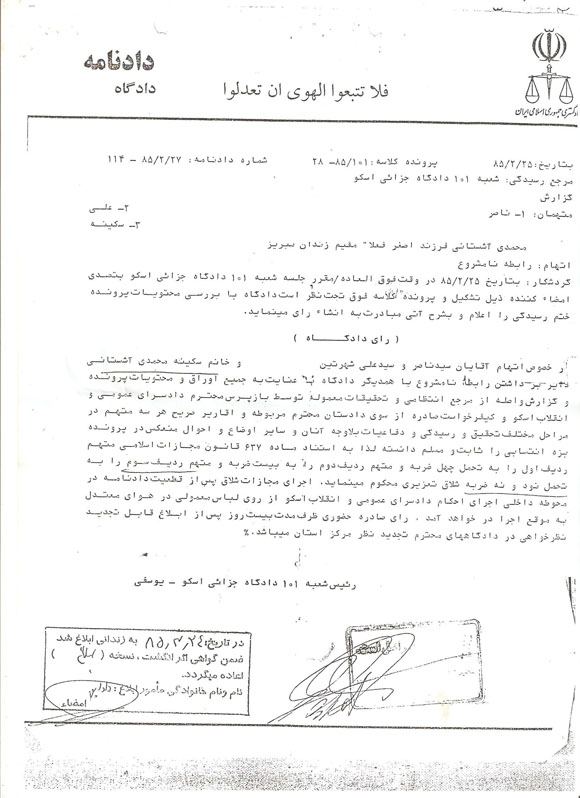
The second document, n° 7, dated 10 September 2006, is even more interesting. It concerns the vote by the Head of section n°6 of the provincial court as well as two of his advisors who carry as much weight as he (Mssrs Imani, Seif Amadi, and Moussavi) in favor of the condemnation of Sakineh to stoning. The word one reads on the document is the Arab term «Rajam» (terms in Arabic are sometimes used in the Iranian legal vocabulary, as is the particular case here). It is interesting to note that, according to this document, the penalty of stoning is pronounced by the three judges uniquely due to Sakineh's "illicit relations" with several men. The accusation of "complicity in murder", repeated many times by the Iranian regime to justify her punishment, is mentioned nowhere in the document.
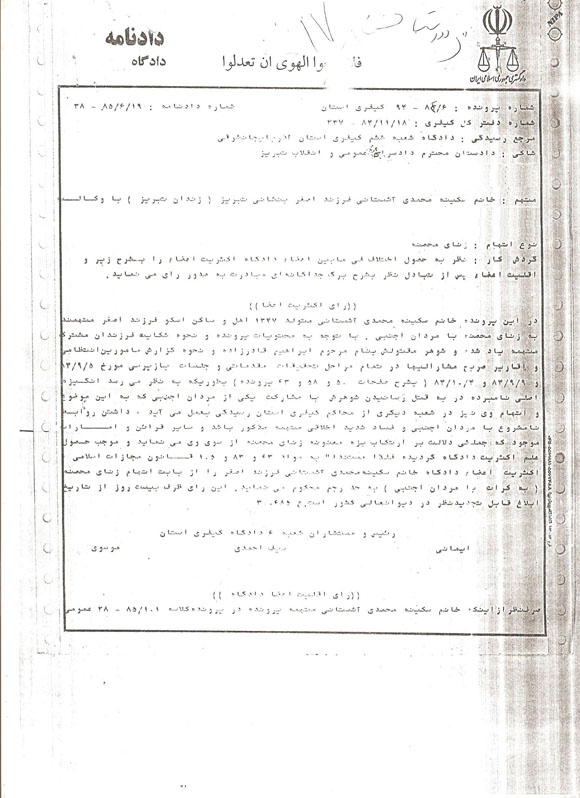
Document n°8 is the follow-up to n°7, thus also dated 10 September 2006. It concerns the votes of two other advisors to section n°6 of the provincial court (Mssrs Kazemi and Hamdolahi), who are demanding the acquittal of Sakineh Mohammadi Ashtiani. They maintain that, having already been judged and sentenced to 99 lashes for adulterous relations with the Nojoumi brothers, the accused cannot be prosecuted anew, at least not as long as the first condemnation has not been annulled. They cite the fact that an individual can be prosecuted only once for the same accusation of crime. Moreover, the two advisors indicate that there exists no confession, nor any deposition by a witness, thus no legal justification for Sakineh Mohammadi Ashtiani to be condemned anew; therefore, they request the liberation of the Iranian woman. The Bench refuses to listen to the observations of these two advisors and supports the decision of theHead of section n°6 and this two advisors of document n°7. Sakineh will thus be, indeed, condemned to stoning for "illicit relations".
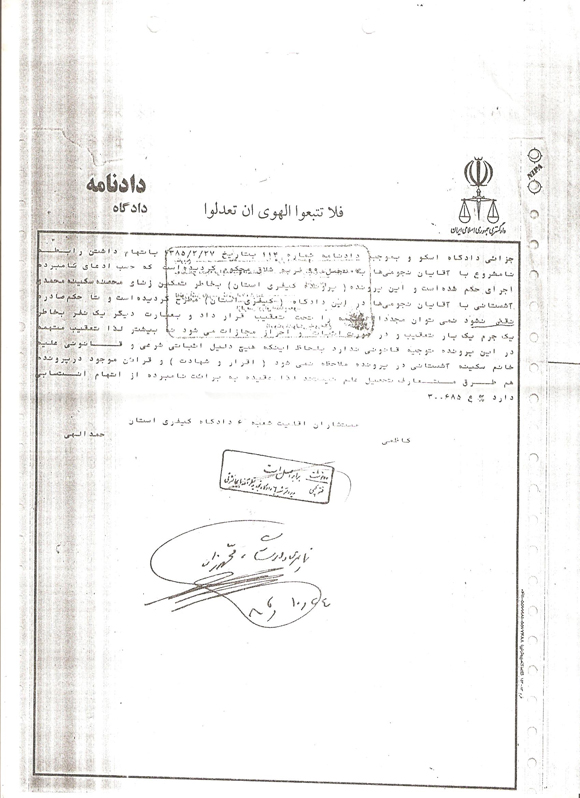
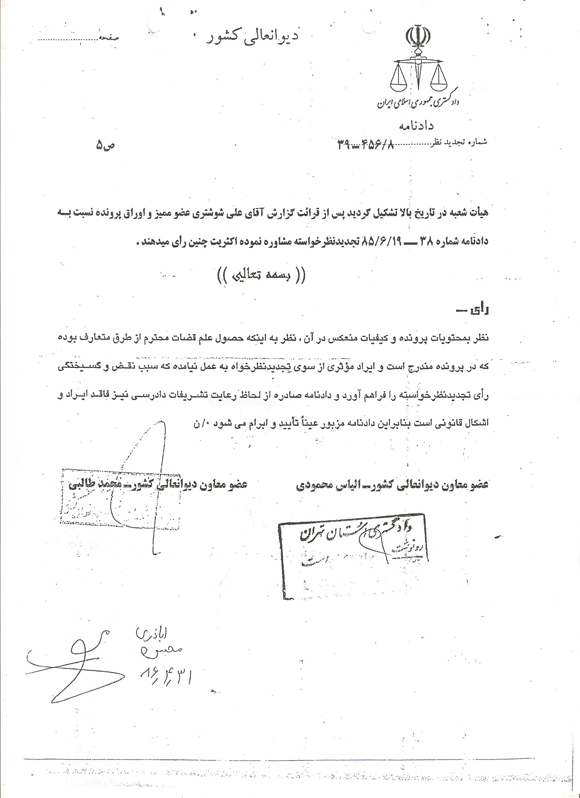
Document n°9, dated July 22, 2007, is as interesting as the previous one, since it concerns the letter of recourse of Sakineh's first Court-appointed attorney, Sohrab Samangar, submitted to the Supreme Court of the country. For the first time, Sakineh Mohammadi Ashtiani is cited and declares that she has carried on no illicit relations with anyone. Her attorney confirms that his client carried on no illicit relations with Issa Tahéri (her husband's murderer) and that neither the latter nor Sakineh Mohammadi Ashtiani have made any confession.
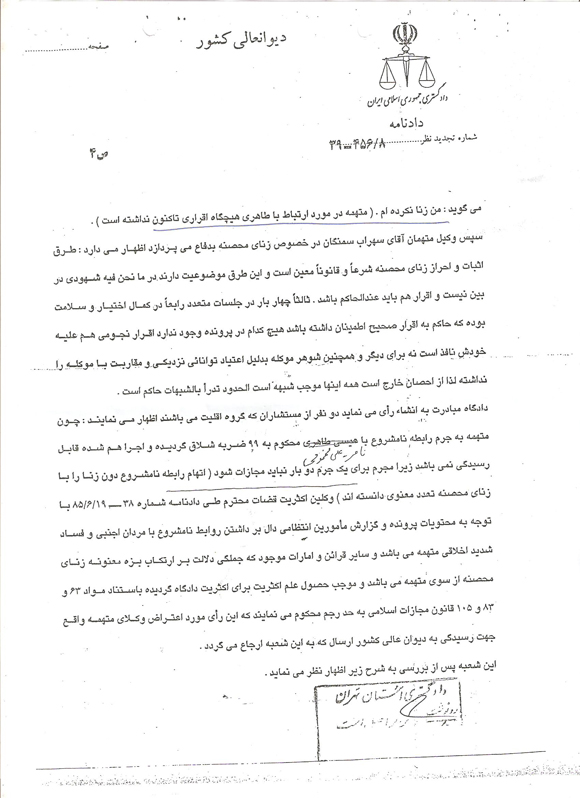
The attorney, Sohrab Samangar, states that the legal and legitimate evidence of adultery on the part of his client is not probative in the least, since there exists no witness and since his client made no confession before the judge. Yet, according to the attorney, only the testimony of witnesses or four confessions offered on several different occasions by his client, in full possession of her faculties, before the judge, can be deemed authentic. In this case and only in this case, the judge could have confirmed the legal character of the confession and thus pronounced sentence. This is not the case, Sohrab Samangar maintains, in Sakineh's case file.
Besides this, and still according to the attorney, the confession of one of the Nojoumi brothers affects only his own case and can in no way incriminate Sakineh. Sohrab Samangar concludes that all of these elements throw doubt and uncertainty on the actual execution of a sentence, now based, as a result, only on the judge's own suspicions.
At the bottom of the document, the attorney repeats that, according to Articles 63, 83, and 105 of the Islamic penal code, his client has been condemned to Rajam, stoning in Arabic, but that this vote is subject to contest by the counsels of the accused, and for this reason he is appealing, on this day, to this branch of the Supreme Council of the country.
Despite this appeal presented by the attorney, the Supreme Court's decision following the appeal confirms the verdict of stoning against Sakineh (document n° 10). In view of the contents of the file, in view of the fact that the "wisdom" of the judges is a valid and justifiable means, and in view, finally, of the fact that the appellate attorney has presented no serious argument to annul the vote, and that this vote was conducted and issued without any legal flaw, the Supreme Court confirms the sentence of stoning and declares it executable at any moment.
Armin Arefi
